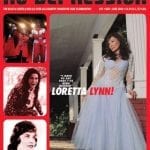Alecia Nugent – All Grown and on Her Own
When Alecia Nugent began to sing with her father’s band, she didn’t realize how unusual it was for a woman to front a bluegrass group. She also hadn’t realized that every bluegrass singer she’d seen onstage played an instrument. She soon learned all about it, though, when she ran smack into the concrete belligerence of the rabid fringe of the bluegrass faithful.
“Right from the start, I heard comments about me being a female singing bluegrass,” says the petite Louisiana native, who took over lead vocals for her father Jimmy Nugent’s Southland Bluegrass Band in 1988 at age 16. “They’d also complain that I didn’t play an instrument, or that I wasn’t old enough to know what I was singing about.”
Her self-titled solo debut, released in March on Rounder Records, not only shows that she withstood the criticism, but it also provides the best kind of argument against such narrow thinking. Nugent has the kind of keening, driving, powerful voice that propels the best contemporary bluegrass. More than that, she transcends genre bounds by bringing a palpable and believable emotional quality to a strong collection of heartbreak songs.
“I’m pretty hard-headed, I guess,” Nugent says with a laugh. She learned to shrug off the doubters with the encouragement and protectiveness of her father, uncle and brother, all of whom were Southland members. “Of course, those kinds of comments hurt my feelings, especially when I was younger,” she allows. “But the fact that my family was always around kept me from hearing it very much. And my dad would say it didn’t matter. He’d say, ‘This is the music you grew up listening to, and you love it, so don’t let it bother you. Just because there aren’t many females that sing this music doesn’t mean you can’t.'”
By now, Nugent has grown accustomed to weathering storms. At 32, she’s a twice-divorced single mother of three who spent the last two years struggling to get legal consent to move her daughters to Nashville. During that time, she’d drive 1,200 miles round-trip to Hickory Grove, Louisiana, every other weekend to visit her children. But the judge has refused to budge, so she’s now back living in Hickory Grove, a tiny city in northern Louisiana, raising her girls and trying to get her career off the ground.
Until three years ago, Nugent had been content with performing periodic shows at regional festivals with the Southland Bluegrass Band, just as she had since her youth. But a couple involved in promoting bluegrass in Mississippi had become devoted fans. They thought she could be a national solo star, and offered to finance a recording session for her in Nashville.
Nugent contacted songwriter/producer Carl Jackson, who she’d met at a Mississippi songwriter gathering, and he agreed to produce the album. “I told him I wanted to do a lot of country songs as well, but I wanted to do them all acoustic with bluegrass players — no drums, no electric instruments,” she says. “I love bluegrass, but I also love the emotion of a great country song, so I wanted an album that had both.”
Jackson put together an all-star band, with Ronnie McCoury on mandolin, Aubrey Haynie on fiddle, Randy Kohrs on dobro, Ben Isaacs on bass, and himself on banjo and acoustic guitar. Nugent chose two favorite old bluegrass songs to cover, Flatt & Scruggs’ “I’ll Stay Around” and the Stanley Brothers’ “Think Of What You’ve Done”, both of which she has performed onstage for years. One of the album’s standouts, “But I Do”, is a reworking of an obscure 1950s gem by Louisiana rockabilly singer Tibby Edwards.
Nugent’s country leanings shine on several ballads, especially Jerry Salley’s “Paper And Pen”, Larry Cordle & Larry Shell’s “My First Mistake”, and a duet with her producer on “For Love’s Sake”. But to truly realize Nugent’s talent, check out her trio harmonies with two other great female bluegrass stylists, Rhonda Vincent and Sonya Isaacs, on the upbeat “You Don’t Have To Go Home”.
Nugent gained her vocal strength because of her father’s insistence that she sing with power or not sing at all. “He was never happy unless I was just bellowing it,” she says with a laugh. “If I held back, he would stop and say, ‘I’m not doing this if you don’t sing out and sing loud!’ That was just his rule. It had to be strong — always. He knew no other way.”
But strength is one thing, emotion is another. Nugent knows that the struggles she’s endured, in both her career and her personal life, have enriched her voice as much as the muscular pipes her father instilled in her.
“I know my record is sad,” she says. “It’s all about broken hearts. With all of the stuff I’ve been through, I guess that’s where it comes from. I’m singing about what I’ve lived. I’m not just singing the words. I can feel everything in those songs.”




